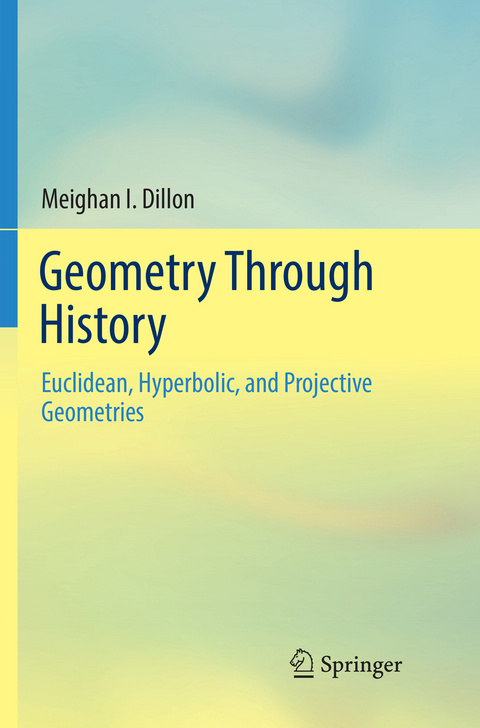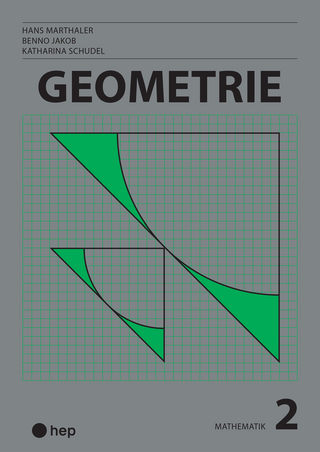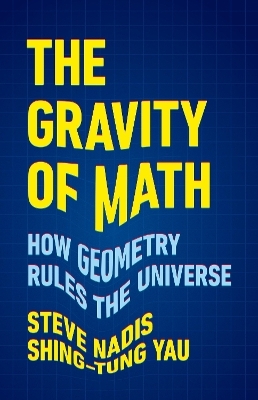
Geometry Through History
Springer International Publishing (Verlag)
978-3-030-08923-8 (ISBN)
Presented as an engaging discourse, this textbook invites readers to delve into the historical origins and uses of geometry. The narrative traces the influence of Euclid's system of geometry, as developed in his classic text The Elements, through the Arabic period, the modern era in the West, and up to twentieth century mathematics. Axioms and proof methods used by mathematicians from those periods are explored alongside the problems in Euclidean geometry that lead to their work. Students cultivate skills applicable to much of modern mathematics through sections that integrate concepts like projective and hyperbolic geometry with representative proof-based exercises.
For its sophisticated account of ancient to modern geometries, this text assumes only a year of college mathematics as it builds towards its conclusion with algebraic curves and quaternions. Euclid's work has affected geometry for thousands of years, so this text has something to offer to anyone who wants to broaden their appreciation for the field.
Meighan Dillon is a Professor of Mathematics at Kennesaw State University. She is a life-long educator, whose research in infinite-dimensional Lie algebras is complemented by explorations in pedagogy and the use of projective geometry in art.
Preface.- 1. The Elements of Euclid.- 2. Neutral Geometry.- 3. The Hyperbolic Plane.- 4. Hilbert's Grundlagen .- 5. More Euclidean Geometry.- 6. Models for the Hyperbolic Plane.- 7. Affine Geometry.- 8. An Introduction to Projective Geometry.- 9. Algebraic Curves.- 10. Rotations and Quaternions.- Index.
"While the book covers some advanced topics, it is also remarkably accessible: anyone with a year of college-level mathematics and a love of geometry will find value in this text, as Dillon (Kennesaw State Univ.) explores axioms, proofs, and an array of fascinating problems. ... One of the most appealing aspects of this book is the author's way of introducing projective geometry to pique the reader's interest in modern algebra. ... Summing Up: Recommended. Lower-division undergraduates and above." (J. A. Bakal, Choice, Vol. 56 (03), November, 2018)
"It discusses a lot of interesting topics in geometry, it is clearly written and should be accessible to its target audience of students ... . it offers students an opportunity to see the relationship between geometry and other areas of mathematics, including abstract and linear algebra. If you are teaching a course in geometry at the college level and the topics discussed here are compatible with your course, this book certainly merits aserious look." (Mark Hunacek, MAA Reviews, October, 2018)
"This is a wonderful new book that could be used as a textbook for geometry, but would be of interest to any mathematician whose work includes some geometry or who is interested in the history of mathematical developments. ... The book offers a deep, thorough, and entertaining presentation of geometry through history." (Tara D. Taylor, Mathematical Reviews, January, 2019)
| Erscheinungsdatum | 05.03.2022 |
|---|---|
| Zusatzinfo | XII, 350 p. 233 illus. in color. |
| Verlagsort | Cham |
| Sprache | englisch |
| Maße | 155 x 235 mm |
| Gewicht | 750 g |
| Themenwelt | Mathematik / Informatik ► Mathematik ► Geometrie / Topologie |
| Mathematik / Informatik ► Mathematik ► Geschichte der Mathematik | |
| Schlagworte | affine Geometry • algebraic curves • development of modern geometries • Euclidean Geometry • Euclid's 'The Elements' • historical development of geometry • history of geometry • hyperbolic planes • neutral geometry • Projective Geometry • quaternions |
| ISBN-10 | 3-030-08923-1 / 3030089231 |
| ISBN-13 | 978-3-030-08923-8 / 9783030089238 |
| Zustand | Neuware |
| Informationen gemäß Produktsicherheitsverordnung (GPSR) | |
| Haben Sie eine Frage zum Produkt? |
aus dem Bereich


